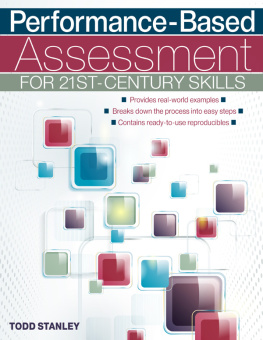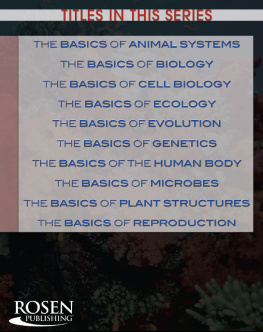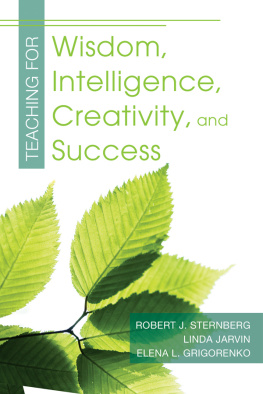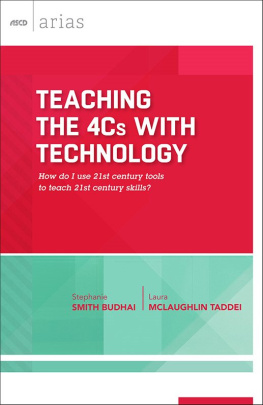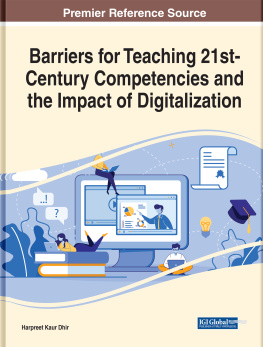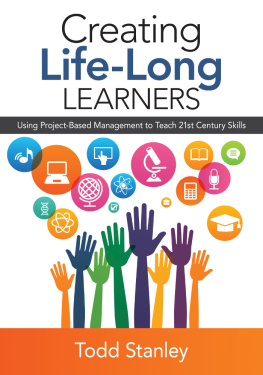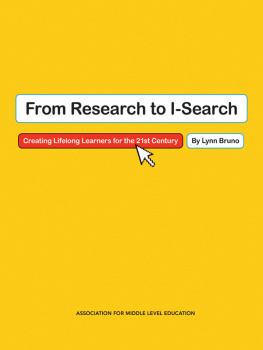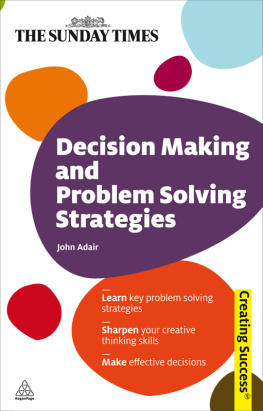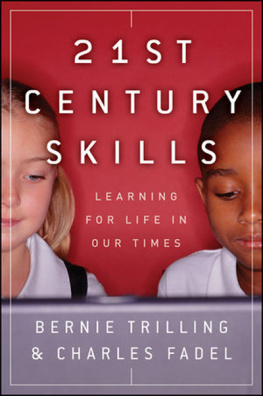ASSESSING
21st Century
SKILLS
To Riley, for whom all things are possible
ASSESSING
21st Century
SKILLS
A guide to evaluating mastery and authentic learning
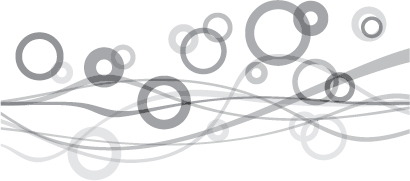
LAURA
GREENSTEIN
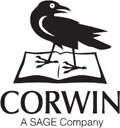
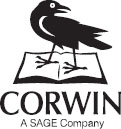
FOR INFORMATION:
Corwin
A SAGE Company
2455 Teller Road
Thousand Oaks, California 91320
(800) 233-9936
www.corwin.com
SAGE Publications Ltd.
1 Olivers Yard
55 City Road
London EC1Y 1SP
United Kingdom
SAGE Publications India Pvt. Ltd.
B 1/I 1 Mohan Cooperative Industrial Area
Mathura Road, New Delhi 110 044
India
SAGE Publications Asia-Pacific Pte. Ltd.
3 Church Street
#10-04 Samsung Hub
Singapore 049483
Acquisitions Editor: Hudson Perigo
Associate Editor: Allison Scott
Editorial Assistant: Lisa Whitney
Permissions Editor: Adele Hutchinson
Project Editor: Veronica Stapleton
Copy Editor: Alan Cook
Typesetter: C&M Digitals (P) Ltd.
Proofreader: Wendy Jo Dymond
Indexer: Gloria Tierney
Front Cover Designer: Lisa Riley
Back Cover Designer: Rose Storey
Copyright 2012 by Corwin
All rights reserved. When forms and sample documents are included, their use is authorized only by educators, local school sites, and/or noncommercial or nonprofit entities that have purchased the book. Except for that usage, no part of this book may be reproduced or utilized in any form or by any means, electronic or mechanical, including photocopying, recording, or by any information storage and retrieval system, without permission in writing from the publisher.
All trade names and trademarks recited, referenced, or reflected herein are the property of their respective owners who retain all rights thereto. Printed in the United States of America.
Library of Congress Cataloging-in-Publication Data
Greenstein, Laura.
Assessing 21st century skills: a guide to evaluating mastery and authentic learning / Laura Greenstein.
pages cm
Includes bibliographical references and index.
ISBN 978-1-4522-1801-4 (pbk.)
1. Educational tests and measurementsUnited States. I. Title.
LB3051.G715 2012
371.26--dc23 2012008928
This book is printed on acid-free paper.
12 13 14 15 16 10 9 8 7 6 5 4 3 2 1
Contents
List of Figures
6.15 Alignment Between National Education
Technology Standards and Common Core State Standards
Preface
W ithout a doubt, we live in complex times. Recently, I was sorting through the stacks of studies, reports, and reviews on 21st century education Ive read, trying to make sense of the diversity of studies, perspectives, and opinions found there. While doing so, I heard an unexpected and most straightforward comment: When times get complicated, people look for simple answers. The speaker was Ira Glass (2010), the producer of This American Life on National Public Radio. He continued to explain that it is difficult for people to face the worlds complexities; as a result of this tendency to oversimplify things, a fact gap exists. His idea rings true to me, because many sectors in education are seeking simple answers to very complicated problems.
Over the years, I have seen a steady stream of initiatives in education. I am still amazed at how these proposals become popular and then fade away. From open classrooms and whole language, to charters and common core, we repeatedly seem to grab on to the latest reform in hope that it will provide an easy fix, only to discard it when it doesnt work and wait for the next best thing to come along. These initiatives fail because of oversimplification, uneven implementation, inconsistent monitoring, and other reasons. Rarely is quality assessment incorporated in the blueprint, yet it must be an essential component of any formula for reform.
Along with complexity, there are a number of current tensions in education. Some say that our schools must undividedly focus on literacy and numeracy. At the same time, there is strong support for college and career readiness. In reality, no one is ready for college and career without a robust foundation in core skills and knowledge. But those foundations must also incorporate 21st century skills: critical thinking, actions for success, and the ability to genuinely apply these in a global society. For the sake of todays students who will be competing in a rapidly changing world, we must extend learning beyond the core and provide relevant and challenging real-world connections throughout their education.
These two ideascore and 21st centuryare not in opposition to each other. 21st century skills do not replace content knowledge, but complement it. Meaningful content, combined with quality instruction and valid assessment, is the starting point for expanding learning opportunities. Embedding 21st century skills, along with relevant assessments connected to real learning, into all parts of the curriculum, is one of the central tasks of teaching in our time. Some might say weve always done this. Progressives in the 1800s were strong supporters of critical intelligence and applied learning. Contemporary figures such as Ted Sizer and Dennis Littky embraced and implemented these ideas. Nonetheless, I contend that we have rarely assessed the outcomes of these practices in a practical and consistent manner.
The research and the voices of authority that are reported on in the book convey an imperative: We must intentionally change both what we are teaching (from simple content to complex thinking) and how we are teaching (from delivery of information to student engagement and building of knowledge). Changes to assessment must follow: We must shift from reliance on traditional selected-choice and completion instruments to a greater emphasis on alternative measures of authentic learning. This requires a refocus from once-a-year, large-scale measures of literacy and numeracy to multiple and local models of assessing higher-level thinking, creativity, collaboration, digital skills, and global understanding.
In a dream, Im standing at a crossroads in educational assessment. The signpost points me in contradictory directions and forces me to make difficult choices. Should I head down the road toward standardized tests or toward alternative assessments? Is content knowledge more important than critical thinking? Do I really have to choose between summative and formative assessment, large scale and local? And then theres that aha! moment when I wake up with clarity. There are decisions to be made, and as I take the first steps, I feel elated and relieved. I can no longer wait for the engines of education to decide the path for me. The guidepost at the beginning asks, What is it that we want and need students to know, understand, and do to be successful in the world of today and tomorrow? I see the path we need to take. It is one that focuses on 21st century outcomes. And I start down it.
In this book, youll find recommendations for action along with strategies for assessment in the 21st century classroom. The ideas extend basic content knowledge into a model of 21st century knowledge and skills, the need for which is driven by current forces such as globalization, technology, and changes in the demands of the workplace. To respond to these circumstances effectively, we must ask ourselves such questions as these: Can our students question and critically evaluate the information they view? Are they able to work together to solve problems? What do they do when faced with new problems? Are they able to understand and synthesize multiple perspectives?
Next page

